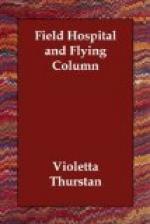Night drew on, and one after another dropped into an uneasy sleep. But we were squeezed so tight, and the wooden third-class carriages were so hard, that it was almost more uncomfortable to be asleep than to be awake. We persuaded the two German soldiers to sit together as that made a little more room, and they soon went to sleep on each other’s shoulders, their rifles between their knees. I was still feverish and seedy and could not sleep, but watched the beautiful starry sky, and meditated upon many things. We passed through Tirlemont, and I thought of my poor nurse and wished I could get out and see what she was doing. Then I began to be rather puzzled by the way we were going. I knew this line pretty well, but could not make out where we were. About three o’clock in the morning I saw great forts on a hill sending out powerful search-lights. I knew I could not be mistaken, this must be Liege. And then we drew up in the great busy station, and I saw that it was indeed Liege. So we were on our way to Germany after all, and not to the Dutch frontier as we had been promised.
Next morning this was quite apparent, for we passed through Verviers and then Herbesthal the frontier town. At the latter place the doors of all our carriages were thrown violently open, and a Prussian officer shouted in a raucous voice “Heraus.” Few of our party understood German, and they did not get out quickly enough to please his lordship, for he bellowed to the soldiers: “Push those women out of the train if they don’t go quicker.” Our things were thrown out after us as we scrambled out on to the platform, while two officers walked up and down having every bag and portmanteau turned out for their inspection. All scissors, surgical instruments and other useful articles were taken away from the Sisters, who protested in vain against this unfair treatment. The soldiers belonging to our carriage, seeing this, tumbled all our possessions back into the carriage, pretending that they had been examined—for we had become fast friends since we had shared our scanty stock of food and chocolate together. I was personally very thankful not to have my belongings looked at too closely, for I had several things I did not at all want to part with; one was my camera, which was sewn up inside my travelling cushion, a little diary that I had kept in Belgium, and a sealed letter that had been given me as we stood outside the station at Brussels by a lady who implored me to take it to England and post it for her there, as it was to her husband in Petrograd, who had had no news of her since the war began. I had this in an inside secret pocket, and very much hoped I should get it through successfully.
We were ordered into the train again in the same polite manner that we had been ordered out. Our two soldiers were much upset by the treatment we had received. One had tears in his eyes when he told us how sorry he was, for he had the funny old-fashioned idea that Red Cross Sisters on active service should be treated with respect—even if they were English. He then told us that their orders were to accompany us to Cologne; he did not know what was going to happen to us after that. So Germany was to be our destination after all.




